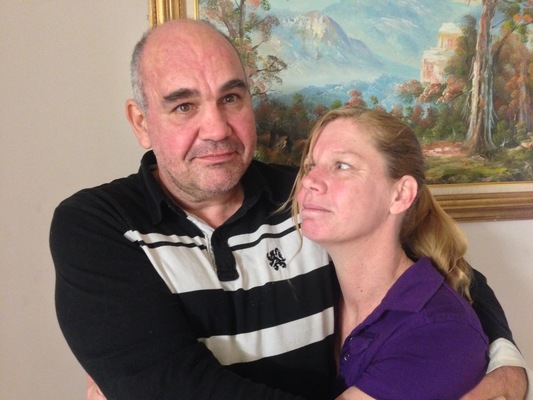By Casey Neill
Stress sent Kathryne Toner’s heart into cardiac arrest.
Her partner’s CPR training saved her life.
“I had a lot of stress, a lot of financial problems and family problems,” the Doveton 45-year-old said.
“I thought I could sort everything out, I thought I could fix everything.
“My heart was exhausted.
“I had a stress-induced cardio myopathy.”
Ms Toner’s “hero” Simon Wells said there was a Japanese word for the condition that translated as broken heart syndrome.
“She basically worried herself into a cardiac arrest,” he said.
Her eyes were open, her pupils were fixed and dilated and she was gasping for breath.
He called an ambulance and turned to his CPR training.
“The first compression I heard a huge crack, and I thought ‘oh my goodness’,” he said.
Ms Toner said: “I’d rather have a crack in my chest than be dead.”
Mr Wells continued the chest compressions and breaths for 10 to 15 minutes, until four ambulances, a fire engine and an intensive care paramedic arrived.
“They watched me for a few minutes while they were setting their gear up and assessing the situation,” he said.
“They tapped me on the shoulder and said ’you’re right mate’ and they took me off and took over.
“It took them another 15 minutes to revive her, just to get a heartbeat.
“It was very loud, the defibrillator. I could hear it working and she wasn’t responding to it.
“They shocked her five or six times.
“She was in that bad of a position that they had to intubate her and put her in an induced coma here.”
They transported her to Monash Medical Centre, where she was placed in the intensive care unit (ICU).
Mr Wells said doctors put Ms Toner into hypothermia for 24 hours, keeping her body temperature at 36 degrees.
“That’s a new treatment they’re doing on patients who have a cardiac arrest,” he said.
“It reduces brain damage.
“They think the brain damage is caused by the sudden flow of warm blood going back to the brain when you’re revived.”
They slowly brought Ms Toner’s temperature back up and woke her. She spent three weeks in hospital and is making a steady recovery from the late August-incident.
“It’s made me have a really good look at life. It’s turned my life around, basically,” she said.
“I’ve been a long-time sufferer of depression.
“I always thought there was someone worse off than me.
“My aim is to let people know that if you’re highly stressed and got a lot on your plate to seek help.
“I’m getting the help I need.”
Ms Toner couldn’t speak highly enough of Mr Wells’ actions, and was thankful he was home.
“Normally, he would have been at work, I would have been home alone,” she said.
“If it wasn’t for him I wouldn’t be sitting here today.
“He’s a hero in my eyes.”
But Mr Wells shrugged off the label.
“Anyone in the same situation would have done the same thing,” he said.
He instead directed the praise to his CPR training and defibrillators.
“I think it’s hugely important for people to get CPR training,” he said.
“If there’s not a defibrillator in your office, there should be one.
“They should be everywhere.
“All CPR does is supply your brain and your organs with oxygen until you can be revived.
“Kathryne went into a fatal heart arrhythmia.
“Without a defibrillator she wouldn’t have survived.
“CPR would never have revived her.”
Call Lifeline on 13 11 14 for 24-hour support.







